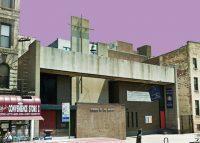A Chinese developer making inroads in New York had an East Village condo project lined up, but ran into one of the pitfalls that make construction here so difficult: the Cranky Neighbor Problem.
Gemini Rosemont seemed well on its way to building an 11-story condominium at 42 Second Avenue. The zoning fit and the Department of Buildings even issued permits.
All that stood in Gemini’s way was a small-time landlord next door. Robert Proto, however, proved to be a big-time problem.
Proto made unceasing calls to officials for weeks, triggering an audit by the Department of Buildings that found code and zoning issues that had initially slipped past the agency.
Proto, who for 11 years has operated the adjacent 10-unit apartment building with his wife, first noted the development site was unsecured in 2020, which he said led to illegal activities and graffiti vandals defacing his top floor facade.
The site had seemed like a good opportunity for Gemini. One occupant, Church of the Nativity, had closed in 2015 as part of a mass consolidation. The other, LaSalle Academy, an all-boys Catholic high school, had moved to East 6th Street in 2010, citing funding issues and “significant” repairs needed.
Second And Second Property, an LLC, bought the properties in 2020, paying LaSalle $14.5 million and the church $40 million. Second and Second’s New Mexico address is an office of Gemini Rosemont, which was formed in 2015 through Hong Kong-based Gemini Investments.
As building violations go, the lack of a barrier between a work site and a sidewalk is as basic as it gets, but it happened repeatedly at Gemini’s site. Building inspectors issued more than a dozen violations over three years.
There were other problems. NYU students who rented from Proto told their parents that people were using drugs and having sex at the construction site next door. Some tenants didn’t renew their leases, Proto said. He alerted his local Assembly member, Deborah Glick, who penned a letter to Buildings.
“Mr. Proto notified Gemini,” she wrote, “but they did not take any action and it took a court injunction order to get Gemini to finally install a required construction fence around the perimeter.”
Proto didn’t stop at calling in complaints. He hired an engineer to scrutinize Gemini’s plans. The investment proved fruitful.
How, the engineer wondered, could Gemini have ensured its project wouldn’t damage Proto’s building without digging up his basement and sidewalk to locate its footings? Not only is that a requirement to get permits, but the East Village has notoriously loose soil and Proto’s building was old, he told city agencies and the courts.
Proto’s landmarked building was built in 1899 with brick with wood joist construction and rubble stone foundation walls, making it “fragile and highly susceptible to settlement and cracking,” according to court records.
Gemini Rosemont brought in a hydraulic hammer to break up the foundation of the former church, shaking Proto’s building violently, bursting heat pipes and water lines and flooding a retail tenant, he said. He filed a lawsuit last year alleging that Gemini Rosemont broke its construction agreement with him. The suit is pending.
Gemini unveiled new plans in April 2022, informing Proto it would underpin every neighboring building except Proto’s, he said.
“Knowing what I know, the system of design would’ve destroyed the building,” Proto said. “It was a recipe for disaster.”
The small-time landlord went to war.
Proto made several calls to Buildings officials before marching into Manhattan commissioner John Raine’s office this past Valentine’s Day. Raine promised to look at the plans, but dismissed Proto’s concerns in an email, the landlord said. Proto rang Raine again.
“By code, they have to know where my footings are, and they don’t,” Proto told him. “They put a footing in the plans that they don’t even know exists.”
Two days later, the agency agreed to audit the plans. In April, the city issued a notice of intent to revoke the permit for Gemini Rosemont’s development.
Although Gemini’s spokesperson told TRD the audit was routine, court documents — including one filed by Gemini’s own attorney — indicate otherwise.
“It is highly unusual for DOB to conduct a post-approval audit of plans that it previously approved,” lawyer Jeremy Cohen wrote to a state judge in May. “It is also highly suspect that the issues identified in DOB’s notice are the exact same issues that respondent [Proto] raised with the court, including issues regarding the line of influence, test pits and the location of underpinning supports.”
The line of influence is a crucial planning tool that ensures nearby properties remain stable.
Auditors found the design plans did not properly address whether the soil and planned underpinning would support nearby buildings, including Proto’s. They also raised concerns about the line of influence and that test pits found collapsing sand under 50 Second Ave.
“The current conditions can cause [a] stability issue” for Proto’s property, their report said.
The audit discovered “multiple code and zoning noncompliance issues,” a spokesperson for Buildings said. However, Gemini Rosemont’s executive in charge of East Coast operations, Brian Ferrier, said the audit was “routine” and merely requested clarification for underpinning, footing elevations and wall removal sequencing.
Ferrier added that all test pits required were performed for design approval, and that additional test pits were planned.
But it appears that someone other than Gemini will have to dig them.
The developer took a step back and assessed the situation: Three years after sinking $55 million into the acquisition and spending millions more on soft costs, all it had was a hole in the ground and a mounting stack of legal bills.
“We were prepared to respond to the audit, but Gemini Rosemont decided to pursue the sale of the land, due to [a] shift in economic approach to our portfolio,” said Ferrier.
Gemini Rosemont operates 101 West 14th Street in Manhattan and recently launched sales at its Williamsburg condominium at 171 North First Street.
Read more



Proto stopped the firm’s project, but says he’s out $500,000 from legal expenses, engineering fees and damages to his building. He hopes to recover some of that with his lawsuit.
Yet he considers himself fortunate to have had the time and resources to defend his building.
“If nothing had been done, my building would have collapsed or been declared structurally unsafe,” Proto said. “I have no doubt about that.”
